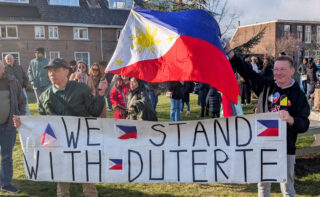Merriam-Webster lists “vote one’s conscience” as an idiom that means “to vote as one feels he or she should.”
The Church, most especially during the time of Lent, has always challenged the faithful to examine their conscience as an invitation to repentance. Examination of one’s conscience involves “reflecting prayerfully on one’s thoughts, words, and deeds in order to identify sins” as defined by the United States Conference of Catholic Bishops. Applied to voting, the call to vote according to one’s conscience has always involved discerning based on available facts about candidates and voting according to the candidate best aligned to your morals within or without the bounds of religion.
In his homily during the Solidarity Mass for the Moral Choice, Catholic Bishops’ Conference of the Philippines president Bishop Pablo Virgilio David mentioned that creating “circles of discernment” and “consensus-building” to respect each individual’s conscience is a difficult process, as opposed to outright dictation of whom to vote for. However, he cautions against ways to muddle and harden this conscience. Bishop David cited the widespread lies, deception, and blind hatred as those that can affect our conscience.
While the call to vote according to one’s conscience by itself is not wrong, the repeated call, much like how the imperative “Vote wisely,” has long been hollow and tone-deaf to the current political landscape. Stated differently, without the guiding moral principles, the call falls short of its supposed intended outcome.
First, we have to ask: Do we have an environment that allows for discernment? Algorithms dictate the way we consume news as opposed to the traditional one-way media. Our news environment is a pandemic all its own: riddled with clickbait headlines that link to dubious websites, falsehoods perpetrated by troll farms and even famous personalities, exaggerated claims and statements deliberately taken out of context, spliced videos patched together to alter the original meaning, all capped with practically no accountability with statements made. The political environment, described as polarized not a few times in the past six years, enabled the ecosystem of mis- and disinformation. Even the most trivial of facts need to be fact-checked just because.
Second, we ask: With this kind of information fed daily, are we, as a people and as individuals, capable of discernment? I would like to believe that we are. The campaign that kicked off for this election is different from that of the past. Volunteer groups are being formed from the bottom-up in support of national candidates. People on the ground are tireless in their persuasion to vote for their candidates. When given a palette of options, Filipinos, long thumbed down and pejoratively described as “bobo,” will think twice or thrice. This is why many have likened the last stretch of the campaign to the last seconds of a crucial basketball game—it’s not over until it is. Sure, there will be hard voters who will stick to their candidates.
Third, the conscience vote, apart from being a personal moral choice, is a collective choice. This is best explained by the French sociologist Émile Durkheim as “the totality of beliefs and sentiments common to average citizens of the same society which has its own life.” We have seen it in the previous revolutions following the times we were held captive in our native land or when a dictator long ruled with might.
The May 9 elections may as well be the most crucial yet, as many have said. The stakes are higher as we look back at the past that led us to where we are now and the future that might as well be written just the same—or not.
They say that we should heed the whisper of conscience—something to mull over the Triduum.
EDWARD JOSEPH H. MAGUINDAYAO
ehmaguindayao@up.edu.ph


